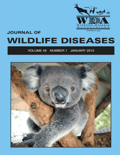
JOURNAL OF WILDLIFE DISEASES
Scope & Guideline
Advancing knowledge for healthier wildlife and ecosystems.
Introduction
Aims and Scopes
- Wildlife Disease Epidemiology:
The journal emphasizes studies that analyze the spread, impact, and control of diseases in wildlife populations, highlighting the importance of understanding disease dynamics in relation to ecological and environmental factors. - Zoonotic Disease Surveillance:
Research focused on zoonotic diseases—those that can be transmitted from wildlife to humans—is a significant area of interest, providing insights into public health risks associated with wildlife. - Pathobiology and Clinical Studies:
The journal publishes findings related to the pathology of diseases affecting wildlife, including clinical case studies that explore diagnostic challenges and treatment responses. - Conservation Medicine:
Articles often address the intersection of wildlife health and conservation, exploring how disease impacts species survival and ecosystem health, thereby informing conservation strategies. - Wildlife Health Assessment Techniques:
Methodological advancements in assessing wildlife health, including biochemical and hematological evaluations, are a core focus, enhancing the ability to monitor and manage wildlife health effectively. - Ecological and Environmental Influences on Wildlife Health:
Research examining how ecological factors, such as habitat alteration and climate change, influence disease prevalence and wildlife health is a recurring theme, linking environmental science with wildlife health.
Trending and Emerging
- Integrative One Health Approaches:
There is a significant trend towards integrating One Health concepts, which emphasize the interconnectedness of human, animal, and environmental health, in studying wildlife diseases. - Genomic and Molecular Pathogen Detection:
Recent publications highlight advancements in genomic and molecular techniques for pathogen detection, allowing for more precise identification and understanding of wildlife diseases at the molecular level. - Impact of Climate Change on Wildlife Health:
Research focusing on how climate change affects wildlife health and disease dynamics is gaining traction, indicating a growing recognition of the need to address environmental changes in wildlife disease studies. - Anthropogenic Effects on Wildlife Disease Dynamics:
Emerging studies are increasingly examining how human activities, such as urbanization and agricultural practices, influence wildlife disease patterns, providing insights for better management and mitigation strategies. - Ethical Considerations in Wildlife Management:
There is a rising interest in the ethical dimensions of wildlife management and conservation, particularly regarding the implications of disease management strategies on animal welfare and ecosystem integrity.
Declining or Waning
- Traditional Pathogen Surveillance:
There has been a noticeable decrease in studies solely focused on traditional pathogen surveillance without integrating ecological or environmental contexts, as the field increasingly emphasizes a more holistic approach to wildlife health. - Invasive Species Impact Studies:
Research specifically addressing the impacts of invasive species on wildlife health appears to be diminishing, possibly due to a shift toward broader ecological studies that encompass multiple factors affecting wildlife. - Historical Disease Documentation:
While historical perspectives on wildlife diseases are important, fewer papers are being published that solely document past disease occurrences without contributing new insights or methodologies.
Similar Journals

Revista Agrogeoambiental
Empowering Agricultural Innovation for a Greener FutureRevista Agrogeoambiental is a prestigious open-access academic journal dedicated to the field of agricultural and environmental sciences. Published by INST FEDERAL SUL MINAS GERAIS-I FSULDEMINAS since 2009, this journal stands as a vital forum for the dissemination of research findings, innovative methodologies, and interdisciplinary studies that address critical issues in agriculture and environmental sustainability. With a focus on promoting knowledge exchange among researchers, practitioners, and educators, Revista Agrogeoambiental seeks to enhance understanding of agroecological systems and their interaction with geospatial frameworks. As an open-access journal, it ensures that cutting-edge research is accessible to a wide audience, thereby fostering collaboration and knowledge-sharing in the global academic community. Researchers and professionals can benefit from the journal's commitment to high standards of scholarship, as well as its role in shaping policy and practice within the agricultural and environmental sectors.

EcoHealth
Empowering Research for a Healthier PlanetEcoHealth, published by Springer, is a premier academic journal at the intersection of ecology and health, dedicated to advancing our understanding of the interconnections between environmental conditions and human health. Established in 2004, the journal aims to contribute to the rapidly evolving field by publishing innovative research that addresses the complexities of socio-ecological systems. With an impressive impact factor reflecting its standing in the Q2 category for both Ecology and Health, Toxicology, and Mutagenesis, EcoHealth is highly regarded among researchers and practitioners alike. The journal’s inclusion in top-tier Scopus rankings—125th out of 461 in Environmental Science _ Ecology and 77th out of 148 in Environmental Science _ Health, Toxicology and Mutagenesis—further underscores its significance in the scientific community. EcoHealth is committed to facilitating open discussions and interdisciplinary collaboration, making it an essential resource for students, researchers, and professionals seeking to explore the critical linkages between ecological integrity and public health.
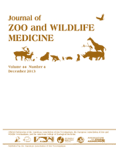
JOURNAL OF ZOO AND WILDLIFE MEDICINE
Connecting professionals for the care of wild species.JOURNAL OF ZOO AND WILDLIFE MEDICINE, published by the American Association of Zoo Veterinarians, serves as a pivotal resource in the field of veterinary science, focusing specifically on the health and well-being of zoo and wildlife species. With an ISSN of 1042-7260 and an E-ISSN of 1937-2825, this journal is recognized for its significant contributions to animal science and has been categorized in the second quartile in both Animal Science and Zoology, as well as Veterinary disciplines, according to the latest rankings. It holds a respectable position within Scopus, being ranked #91 in General Veterinary and #290 in Animal Science and Zoology. While the journal operates on a subscription basis, its impactful research articles have been invaluable for clinicians, researchers, and students alike, providing crucial insights that advance wildlife conservation, veterinary practices, and animal health care from 1993 to the present. With a global reach and a targeted focus on both theoretical and practical applications, JOURNAL OF ZOO AND WILDLIFE MEDICINE is instrumental in fostering collaboration among professionals dedicated to the study and care of wild animal populations.
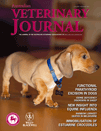
AUSTRALIAN VETERINARY JOURNAL
Empowering the veterinary community with quality research.AUSTRALIAN VETERINARY JOURNAL, published by Wiley, is a leading journal dedicated to advancing the field of veterinary science. With a rich history dating back to 1925, this journal has become a vital resource for researchers, professionals, and students interested in veterinary medicine and its diverse applications. As evidenced by its impressive Scopus ranking, placing it in the 67th percentile among General Veterinary publications, and categorized within Q3 of the Medicine (miscellaneous) and Q2 of the Veterinary (miscellaneous) quartiles for 2023, AUSTRALIAN VETERINARY JOURNAL is recognized for its commitment to quality research and impactful contributions. Although not an open access journal, it continues to be an essential platform for disseminating vital findings and innovations within the veterinary community, fostering collaboration and advancement in animal health and welfare.

CALIFORNIA FISH AND GAME
Championing Biodiversity and Ecological InsightCalifornia Fish and Game is a prominent journal dedicated to the fields of Animal Science and Aquatic Science, published by the California Fish and Game Editor. With its roots extending back to 1979, the journal has served as a vital platform for disseminating research focused on the wildlife and aquatic ecosystems of California and beyond. Recognized within the Q4 quartile for both Animal Science and Zoology and Aquatic Science, it provides critical insights and scholarly contributions, despite its comparative rankings within the respective categories. The journal, with an ISSN of 0008-1078 and an E-ISSN of 2331-0405, offers an invaluable resource for researchers, professionals, and students alike, looking to deepen their understanding of California's rich biodiversity and ecological challenges. For those interested in open access options, further details can be reviewed through the journal's platform. By fostering a community of inquiry, California Fish and Game plays an essential role in advancing knowledge and conservation efforts in the fields of interest.
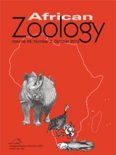
AFRICAN ZOOLOGY
Connecting Researchers with Nature's DiversityAFRICAN ZOOLOGY, published by Taylor & Francis Ltd, stands as a significant journal in the realm of Animal Science and Zoology, with a proud history dating back to 1996 and slated to continue until 2024. With an ISSN of 1562-7020 and E-ISSN 2224-073X, this journal provides a reputable platform for researchers and practitioners dedicated to the study of animal biology across the African continent. It has been recognized for its quality scholarship, evidenced by its Q3 categorization in the 2023 Scopus quartile rankings and an impressive rank of #182 out of 490 within its field. As an open-access journal, it facilitates the dissemination of vital research findings and promotes broader accessibility, catering to a diverse audience of professionals, scholars, and students alike. The journal aims to enhance our understanding of wildlife, conservation, and ecosystem dynamics in Africa, fostering collaborations that address critical ecological challenges. For researchers and enthusiasts keen on contributing to and staying informed about advancements in zoological science, AFRICAN ZOOLOGY is an essential resource that enriches the global discourse on biodiversity and conservation efforts.
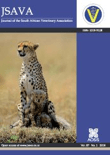
Journal of the South African Veterinary Association
Bridging Gaps in Veterinary Research and PracticeJournal of the South African Veterinary Association is a prominent Open Access journal dedicated to advancing the field of veterinary science since its inception in 1945. Published by MEDPHARM PUBLICATIONS PTY LTD, this journal stands out with an impactful HIndex and a commendable categorization in 2023, ranking Q3 in Medicine (miscellaneous) and Q2 in Veterinary (miscellaneous). With a Scopus rank of 96 out of 194 in the veterinary field, it serves as an essential resource for researchers, veterinary professionals, and students, promoting the dissemination of high-quality research and knowledge. The journal offers a platform for peer-reviewed articles covering diverse topics relevant to veterinary and animal health issues, encouraging expansive dialogue and collaboration within the academic community. Based in Centurion, South Africa, and accessible globally since it adopted an Open Access model in 1997, the journal exemplifies a commitment to accessibility and the sharing of knowledge.

WILDLIFE SOCIETY BULLETIN
Shaping policies with critical wildlife insights.WILDLIFE SOCIETY BULLETIN is a premier publication in the field of wildlife management and conservation, published by Wiley. With an ISSN of 2328-5540, it serves as an essential resource for researchers, professionals, and students invested in advancing knowledge related to wildlife ecology, behavior, and conservation practices. Although currently not open access, the journal provides a platform for high-impact research and critical insights that contribute to the sustainable management of wildlife and their habitats. The WILDLIFE SOCIETY BULLETIN aims to foster interdisciplinary discussions and provide a vital connection between academia and practical applications, ultimately promoting a deeper understanding of wildlife conservation challenges and solutions. Located at 111 River St, Hoboken, NJ, it continues to be influential in disseminating significant findings that shape policies and practices in wildlife stewardship.

Journal of Zoo and Aquarium Research
Connecting research and practice for biodiversity preservation.Journal of Zoo and Aquarium Research is an esteemed publication dedicated to advancing the field of zoology and aquatic sciences. Published by the European Association of Zoos & Aquaria (EAZA), this journal provides a dynamic platform for sharing groundbreaking research, best practices, and conservation efforts within zoos and aquariums, making it an invaluable resource for researchers, professionals, and students alike. With an increasing focus on the importance of biodiversity and sustainable practices, the journal is committed to fostering scholarly communication that enhances the understanding of animal care, species conservation, and habitat preservation. Although specific metrics such as impact factor and HIndex are currently unavailable, the journal's rigorous peer-review process ensures that only high-quality research is disseminated. As an open-access publication, the Journal of Zoo and Aquarium Research promotes accessibility to vital information, encouraging a broader engagement with critical issues in wildlife conservation. By addressing contemporary challenges in the field, this journal stands as a pivotal resource for those dedicated to promoting animal welfare and ecological sustainability.
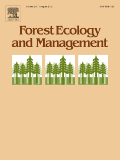
FOREST ECOLOGY AND MANAGEMENT
Pioneering Research for Forest ConservationFOREST ECOLOGY AND MANAGEMENT is a premier peer-reviewed journal dedicated to the integral study of forest ecosystems and their management, published by Elsevier in the Netherlands. With an impactful presence in the field, this journal boasts a prestigious Q1 ranking in multiple categories, including Forestry, Management, Monitoring, Policy and Law, and Nature and Landscape Conservation as of 2023. It addresses key issues relevant to sustainable forest practices, conservation strategies, and environmental monitoring, making it a vital resource for researchers, practitioners, and policymakers alike. The journal is indexed with an impressive Scopus rank, placing it among the top tier of titles in Agricultural and Biological Sciences and Environmental Science. While it does not offer Open Access options, its rigorous review process and high visibility make it essential for those seeking to stay abreast of the latest findings and trends in forest ecology and management. Published continuously since 1976, FOREST ECOLOGY AND MANAGEMENT aims to foster interdisciplinary collaboration and advance knowledge critical to the stewardship of forest resources in an ever-changing global landscape.